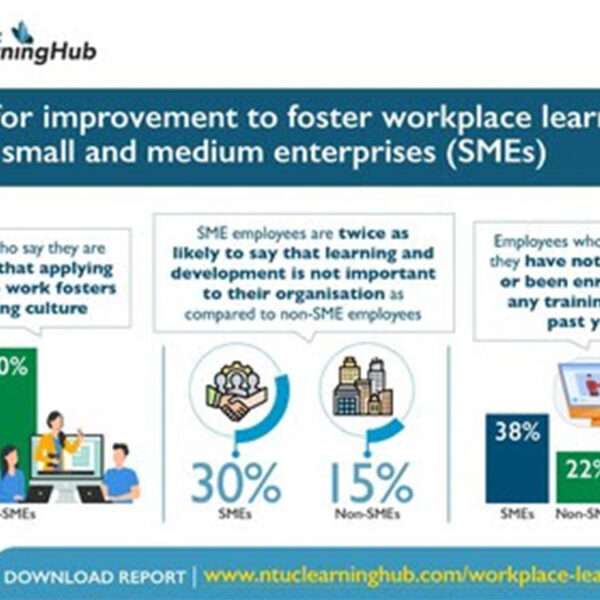A well-known strategic imperative for attracting and keeping talent for corporate sustainability is learning and development (L&D). However, just half (48%) of managers in SMEs share the belief that putting new knowledge to use at work encourages the development of a learning culture, compared to 71% of managers in bigger organizations. Employees in SMEs are also twice as likely (30%) as those in non-SMEs (15%), to say that L&D is not relevant to their organization.
These are some of the main conclusions from the newly released State of Workplace Learning (SWL) Report 2022 from NTUC LearningHub. Based on a survey of 450 Singapore-based full-time professionals, comprising 150 managers and 300 working professionals, the SWL Report 2022 was created. It is a follow-up to the Workforce Learning in Workplace Transformation Report 2021 and intends to shed light on the dual perspective on managers’ roles in employee learning as well as the intended and current stages of workplace learning.
Compared to employees at larger organizations (26%), more SME employees (41%) believe their company does not offer them enough opportunities for training. In contrast, compared to the average of one in five (22%) non-SME employees, two in five (38%) SME employees say they haven’t attended or registered in any training in the last year. Commenting on the findings, NTUC LearningHub’s Chief Human Resource Officer, Sean Lim, says, “SMEs do recognize that learning and development is a form of investment that brings tangible benefits for the company. As the economy enters an era of digitalization and digital transformation post-pandemic, SMEs must take a proactive approach in supporting their employees to upskill and keep pace with the changing economy. Employees in SMEs who are time-starved can consider online learning as an alternative to conventional physical classes, such as through the NTUC LearningHub Learning Experience Platform (LXP) which serves bite-sized modules, enabling users to learn on-the-go, at their own pace and own time. Given the value of learning and development for businesses, SMEs should work with training providers to identify competency and skills gaps so as to recommend relevant courses for their employees to upskill and/or reskill.”

